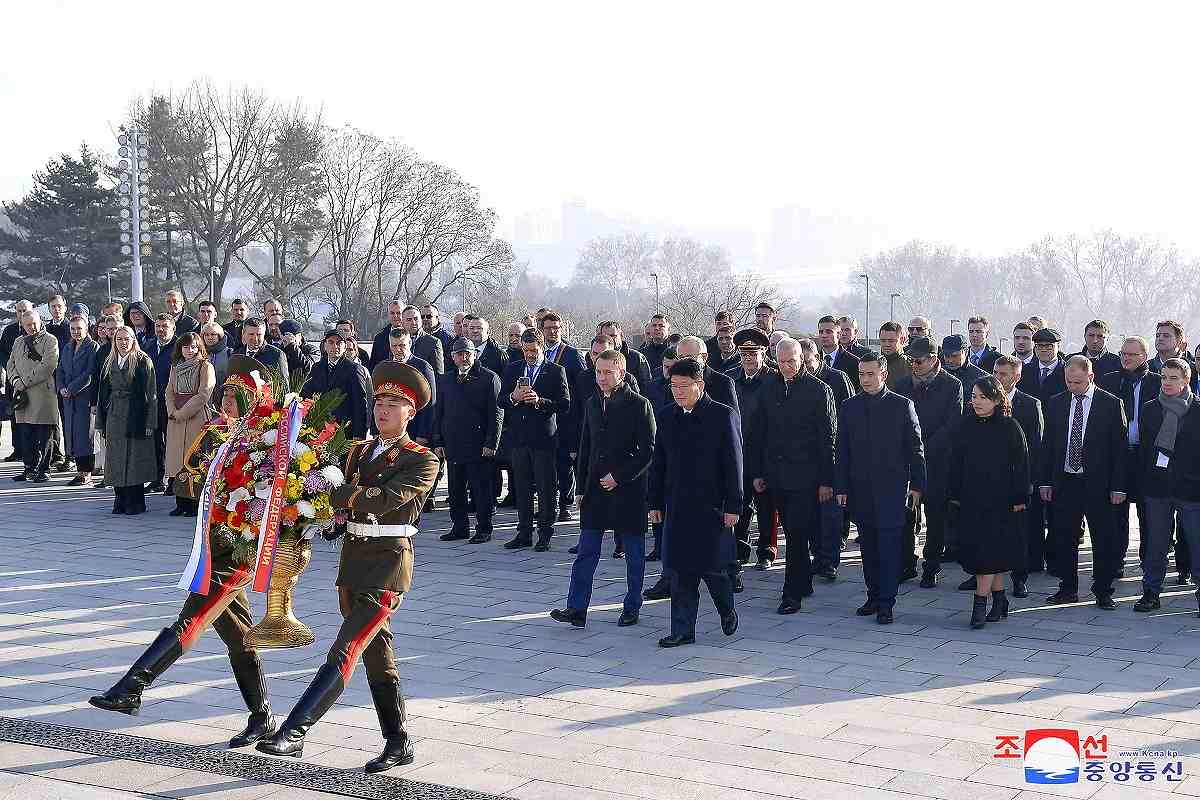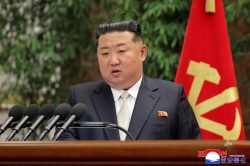
A Russian delegation led by Alexander Kozlov, the minister of natural resources, presents flower baskets to the statues of North Korea’s founder Kim Il Sung and late leader Kim Jong Il at Mansudae Hill, in Pyongyang, North Korea, November 14, 2023.
13:05 JST, November 15, 2023
SEOUL (Reuters) – A Russian delegation led by natural resources minister Alexander Kozlov is visiting Pyongyang, North Korean state media said on Wednesday, as the politically isolated state announced new progress in its banned ballistic missile program.
Kozlov arrived on Tuesday, as U.S. Defense Secretary Lloyd Austin met with U.N. member states enforcing the Korean War armistice in Seoul and said they were concerned that China and Russia are helping North Korea expand its military capabilities by enabling Pyongyang to evade U.N. sanctions.
Russia and North Korea were conducting talks on economy, science and technology, KCNA state media reported, without elaborating.
Kozlov told a reception that Russia wants to develop “substantial cooperation” with North Korea based on the agreements made by Russian President Vladimir Putin and North Korean leader Kim Jong Un when they met in September in Russia’s far east, KCNA reported.
He also cited North Korea’s “full support” for Russia over regional and international issues, the report said.
North Korea is in its final stages of preparation for the launch of a spy satellite, and appears to have received technical assistance from Russia, South Korea’s intelligence agency said this month.
NEW MISSILE ENGINES
North Korean state media also reported on Wednesday that the country had successfully conducted static tests of “new-type high-thrust solid-fuel engines” for intermediate-range ballistic missiles (IRBMs).
“The test provided a sure guarantee for reliably accelerating the development of the new-type IRBM system,” KCNA said.
North Korea’s General Missile Bureau attached great significance to the new IRBM, saying the recent tests are essential for enhancing the strategic offensive capabilities of the military in light of “the grave and unstable security environment facing the country” and the “vicious” collusion of its enemies, KCNA added.
Military analysts say solid-fuel missiles are easier and safer to operate, and require less logistical support, making them harder to detect and more survivable than liquid-fuel weapons.
This year North Korea tested its first solid-fuel intercontinental ballistic missile (ICBM) – the largest category of ballistic missile – and also uses the technology in a range of smaller weapons.
North Korea’s missile program, as well as its nuclear weapons, have been banned by U.N. Security Council resolutions, which imposed sanctions on the country.
Washington has accused North Korea of supplying military equipment to Russia for use in its war with Ukraine, and Moscow of providing technical military support to help North Korea.
North Korea and Russia have denied any arms deals, though their leaders pledged closer military cooperation at their September summit.
Top Articles in News Services
-

Survey Shows False Election Info Perceived as True
-

Hong Kong Ex-Publisher Jimmy Lai’s Sentence Raises International Outcry as China Defends It
-

Japan’s Nikkei Stock Average Touches 58,000 as Yen, Jgbs Rally on Election Fallout (UPDATE 1)
-

Japan’s Nikkei Stock Average Falls as US-Iran Tensions Unsettle Investors (UPDATE 1)
-

Japan’s Nikkei Stock Average Rises on Tech Rally and Takaichi’s Spending Hopes (UPDATE 1)
JN ACCESS RANKING
-

Producer Behind Pop Group XG Arrested for Cocaine Possession
-

Japan PM Takaichi’s Cabinet Resigns en Masse
-

Man Infected with Measles Reportedly Dined at Restaurant in Tokyo Station
-

Israeli Ambassador to Japan Speaks about Japan’s Role in the Reconstruction of Gaza
-

Videos Plagiarized, Reposted with False Subtitles Claiming ‘Ryukyu Belongs to China’; Anti-China False Information Also Posted in Japan
























